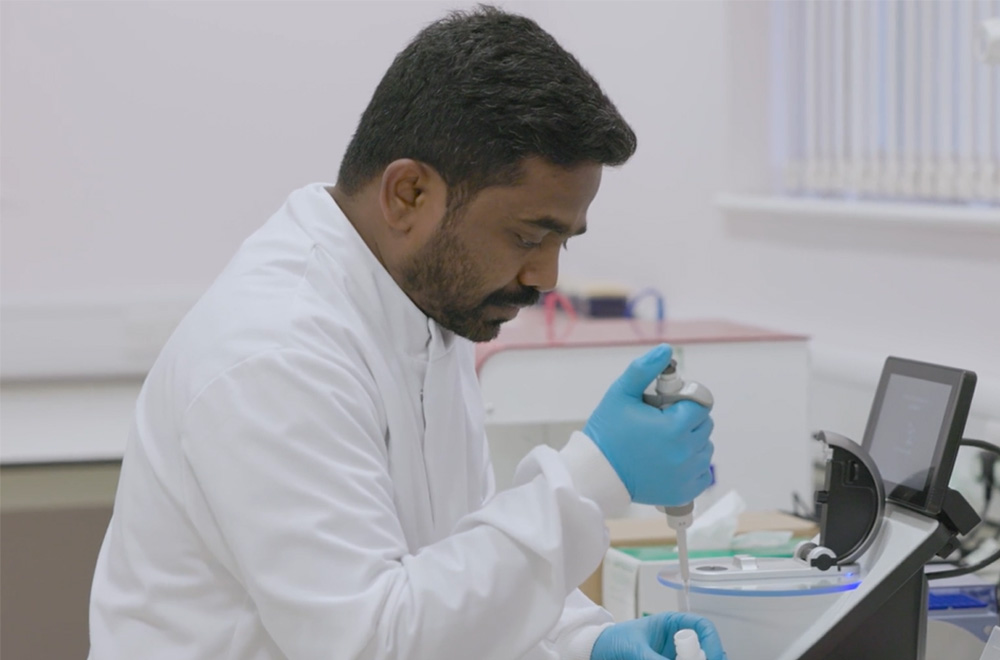Genetics and epilepsy
As research develops, we are learning more about our genes, and how they affect our chances of developing different medical conditions and how we respond to medication.
Researchers now believe that the chance of developing epilepsy is probably always genetic to some extent. This means that most people with epilepsy have a genetic tendency to have seizures.
This is the case even if a person starts having seizures after a brain injury or if they have damage to the brain left by a stroke or infection. This damage combined with the underlying genetic tendency, causes seizures to start. This makes sense if we consider that many people might have a similar brain injury, but not all of them develop epilepsy afterwards.
Any of us could have a one-off single seizure under certain circumstances, but for most people, their natural resistance to having seizures is high enough to stop that happening. This natural resistance is part of our genetic makeup, and is sometimes called our ‘seizure threshold’.
Is there a ‘gene for epilepsy’?
There is no one single gene for epilepsy. So far, more than 300 genes linked to different epilepsies have been identified. Some epilepsies have several genes that may contribute in some way to the person’s chance of developing that epilepsy.
Does ‘genetic’ mean my epilepsy is inherited?
Genetic conditions can happen when you inherit an altered or changed gene from your parents. This can increase your chance of developing a genetic health condition. However, as changes to genes can happen randomly before we are born, but after we are conceived, not all genetic conditions are passed down from our parents. However as changes to genes can happen randomly, hereditary, or ‘inherited’ conditions or diseases are caused by changes to all our genetic material, sometimes called our genome. These are passed on by our parents.
Could my child inherit my epilepsy?
Most parents with epilepsy do not have children with epilepsy, and the chances of inheriting epilepsy are generally low. The risk for any child to develop epilepsy by the age of 20 is around 1 in 100 (1%), and the risk may increase to around 2 to 5 in 100 (2 – 5%) for most children of parents with epilepsy. However, the chances of your child inheriting epilepsy will vary, due to different factors. These include what type of epilepsy you have, and whether it may be due to a genetic change that can be identified, at what age it started, and whether your partner or another child of yours has epilepsy. All these factors, plus others which may be unique to your child’s own genetic makeup, contribute to the chance of your child developing seizures. Your neurologist can give you more information about your epilepsy.
What is genetic testing?
Genetic or genomic testing can help to identify changes in genes that can cause certain health conditions. It usually involves taking a sample of your blood or saliva and sending it to be analysed at a laboratory.
Whole genome sequencing
This test looks at all your genes at the same time. It focuses on changes in genes that are related to your epilepsy, rather than changes in genes that cause other conditions. This is because there is so much information to process. The results may help to:
- diagnose your condition;
- suggest the best treatment options;
- monitor other parts of the body that may be affected; and
- tell you whether your condition could be inherited, to help you with family planning.
This could mean other members of your family may be affected, or that it could be passed on to your children. If this is the case your relatives may be offered testing.
Read about our genomics clinic and the genomics research being carried out at the Epilepsy Society.
Can I have genetic testing?
NICE recommendations
New guidance published by the National Institute for Health and Care Excellence (NICE) recommends whole genome testing specifically for people whose epilepsy:
- started before two years of age; and
- is associated with developmental disorders or certain clinical features that are more likely to have epilepsy as a genetic cause.
At the Epilepsy Society
At the Epilepsy Society we are running an innovative epilepsy genomics clinic. The new clinic at our Chalfont Centre in Buckinghamshire enables us to see people who are thought, or known, to have an underlying genetic cause for their epilepsy. We are the first specialist centre in the country to be running this type of clinic for epilepsy.
The Epilepsy Society is also undertaking valuable research in the genomics field. Read more about our genomics research and how we are changing lives.
Further information
Epilepsies in children, young people and adults - NICE
Genetic and genomic testing - NHS
Information updated: September 2024
Talk on genetics research by Epilepsy Society's Professor Sanjay Sisodiya
Want to know more?
For a printed copy contact our Helpline
How epilepsy is diagnosed
Diagnosing epilepsy is not simple. Doctors gather lots of different information to assess the causes of seizures. If you have had two or more seizures that started in the brain you may be diagnosed with epilepsy.


